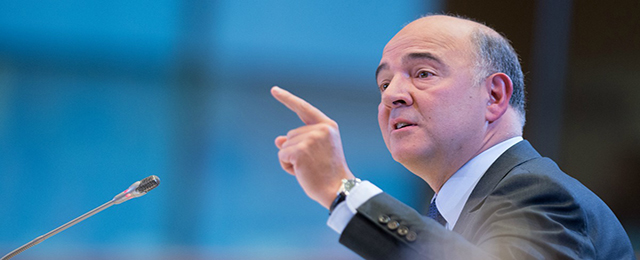Moscovici could be just the right politician to lead the Fiscal Compact (the budget stability agreement signed in 2012). The Fiscal Compact was the cornerstone of discussions at the Euro parliament hearings this week. The Commissioner designate of Economic Affairs emphasised his willingness to impose sanctions against any country that doesn´t follow the macro rules set out in the legal framework.
“Europe’s fiscal rules must be respected and no favourable treatment will be handed out to anyone”, he stated in front of MEPs, although the recent French budget shows the country will fail to meet the 3% debt to GDP target until 2017. To dispel concerns about possible conflicts of interest, Moscovici explained, “I don’t have the items to analyze the draft presented, but I will follow what the current Commission decides”.
The former French minister was keen to reiterate that the fiscal rules cannot be violated. He is aware that his chances of getting the go-ahead from EU legislators depend heavily on his personal credibility. Speaking to The Corner, Marco Incerti, Research Fellow from the Center for European Policy Studies (CEPS), highlighted the delicacy involved in any negotiations pertaining to the mechanisms employed for euro zone growth.
“He is a good, experienced politician, so he tried to open as many doors as possible while staying within the boundaries of his mandate. Moscovici will have to work with at least with one other person, the Vice -President from Finland, who has rather different political convictions”, added Incerti.
Devising an implementation strategy for the €300bn investment programme proposed by Jean-Claude Juncker will be the second task on Moscovici´s agenda. Instead of Eurobonds, the Commission wants to use the Financial Transaction Tax (FTT) as a means of injecting life into the EU economy without jeopardising national budgets. Brussels´ capacity to stimulate growth has again been met with skepticism from many MEPs, particularly those from the left side of the chamber.
“We need much more public investment and to put an end to this austerity policy”, said Marisa Matias, the Portuguese legislator from GUE/NGL in the Economic Committee. She added that “focusing only on flexibility will not tidy up the problems we face, like unemployment”.






“the Commission wants to use the Financial Transaction Tax (FTT) as a means of injecting life into the EU economy”
Citing the EU Commission’s FTT Impact Assessment, “a 3.43% fall in EU GDP equates to a fall in economic output worth €421 (£362) billion and a 0.34% fall in employment equates to a loss of 812,000 jobs.”